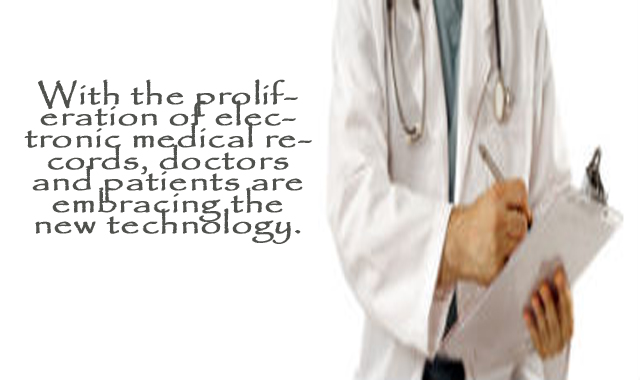Imagine logging into your computer, getting your laboratory results and physician’s notes from your doctor, and then sharing them on Facebook with a click.
Jan Walker, a nurse at Beth Israel Deaconess Medical Center in Boston, told Healthline she hasn’t heard of that happening, yet. “But I think it’s inevitable that it’s going to show up,” she said.
Walker and colleagues from the Harvard-affiliated Boston hospital, as well as Harborview Medical Center in Seattle and Geisinger Health System in rural Pennsylvania, authored a study published this week in The New England Journal of Medicine.
More than 100 doctors from those hospitals invited 20,000 patients to view their medical records—and doctor’s notes—through an online portal. The overwhelmingly positive response by doctors and patients alike was stunning, said Dr. Joann Elmore of Harborview.
The study showed that 80 percent of patients read the notes. Most reported feeling more in control of their health and better prepared for doctor’s visits, and they were more likely to take their medication correctly and on time.
Access to Electronic Medical Records Mixed
Doctors, who have traditionally written notes only for themselves or other doctors, also expressed satisfaction with the program. At the end of the year-long study, which began in 2010, 99 percent of patients wanted to keep getting doctor’s notes online. None of the doctors discontinued the program.
Elmore told Healthline that unlike Walker’s hospital, the Harborview medical center serves many patients who do not have online access. She personally saw to it that the 200 patients who signed up for the project learned how to set up virtual accounts.
While some U.S. hospitals, including Beth Israel, already offer electronic medical records through online portals, many others do not. At Beth Israel, adding the doctor’s notes feature was easy, but for Harborview, an entire system had to be created.
“We have a high percentage of people without insurance and who are homeless,” Elmore told Healthline. “We shouldn’t have a digital divide.”
She said Harborview’s patients went to the library to get online or used a friend’s computer. The hospital also offers computer access. She said patients with HIV in particular had a positive experience with the system, and she is hoping to publish a paper on that soon.
Find the Top Android and iPhone Apps for Managing HIV »
Walker reported the same positive results. “About 70 percent of patients across the board who read their notes said they understood their diagnosis better, understood what they were supposed to do, and took better care of themselves,” she said. “Patients are getting a lot out of this.”
Obamacare Fuels a Technological Push
The government is now offering incentives for providers to start using electronic medical records, and more than two million Americans already have access to them. The Asbury Group, a company that helps health care providers convert to electronic records, estimates that virtually all medical records will be digital by 2019.
“Hospitals will be judged – and reimbursed – on how well they’re managing to keep patients from returning,” Chip Burns, president of The Asbury Group Integrated Technology, told Healthline. “Having monitoring technology and two-way streams of information in place are key to doing that.”
Getting test results and other health information online is a far cry from the days when patients had difficulty obtaining even a paper medical record, or had to pay high prices for copies. The new study suggests that many patients want to know more about their health and to share their health information with caregivers.
A recent study by research firms Aeffect and 88 Brand Partners showed that an estimated 24 percent of Americans are already using electronic medical records, and that 52 percent said they would like to but are not for a variety of reasons.
Another recent study of more than 300 doctors in the Buffalo, N.Y. area who updated their electronic medical records systems showed improved outcomes for their diabetic patients.
At the same time, some have raised concerns about the security of electronic medical records, particularly those stored in the cloud. A recent study detailed precautions that can to be taken to ensure patient privacy.
For the most part, Elmore said that obtaining medical records online is no different from password-protected banking. “But yes, of course we need to always update security,” she said.
A Plan to ‘Take Back the Note’
Doctors sharing medical information with patients also raises questions about the nation’s health literacy. The U.S. Centers for Disease Control reports that nine out of 10 Americans have a difficult time digesting the health information they receive at the doctor’s office.
This concerns Elmore, though she is a firm believer in transparency and the fact that online medical records give patients better control over their health. She says she wants to “take back the note.”
“I never have been trained in how to write a note,” she said. “For instance, if I write ‘Normal BS’ in a note, that means normal bowel sounds. ‘SOB’ is shortness of breath.”
She envisions a future in which software inserts online links to articles about complicated medical terms or even converts the notes to a sixth-grade reading level. Walker said her patients are already getting by simply Googling concepts they don’t understand. Source


































